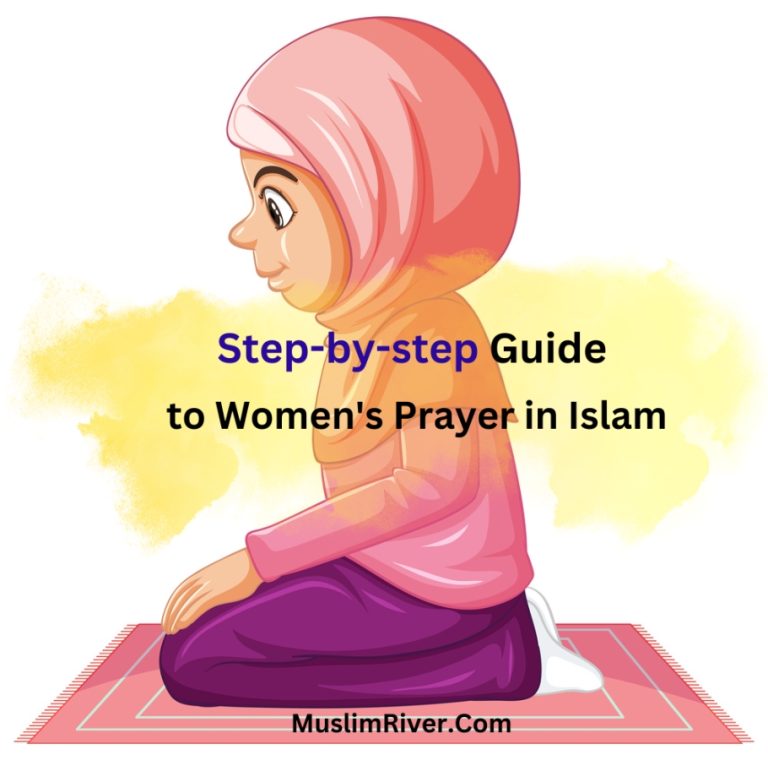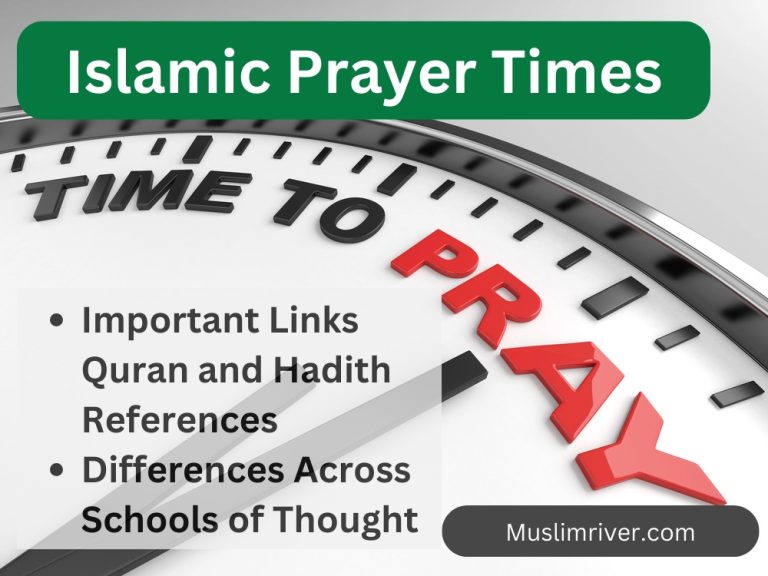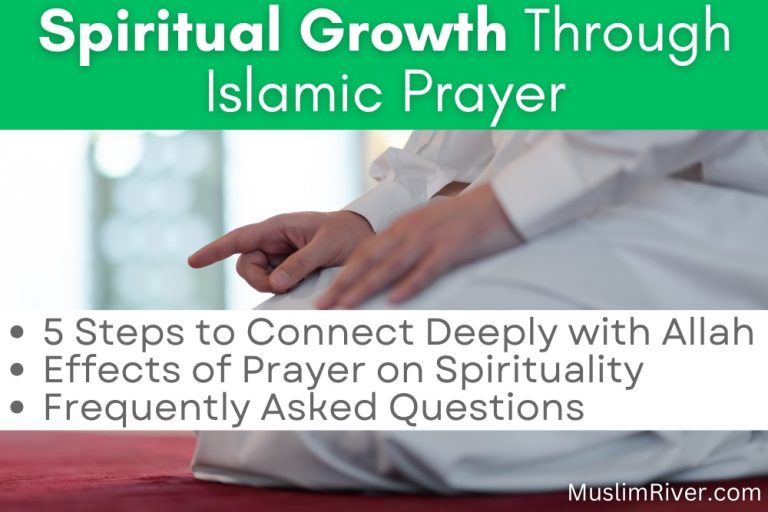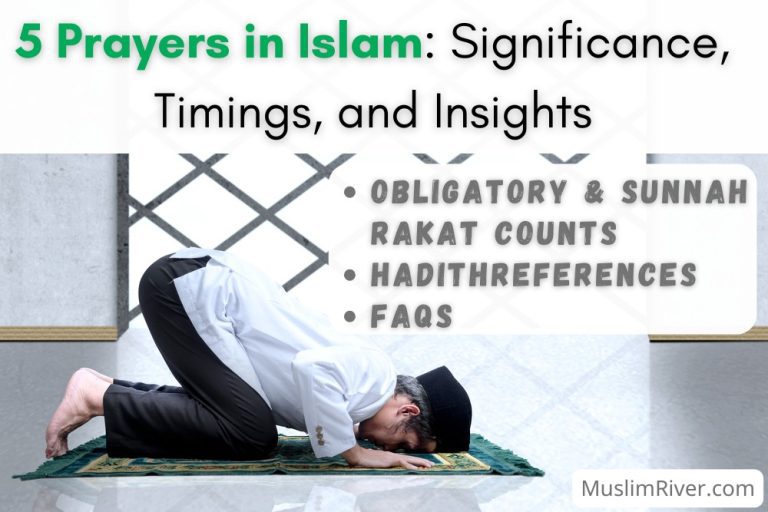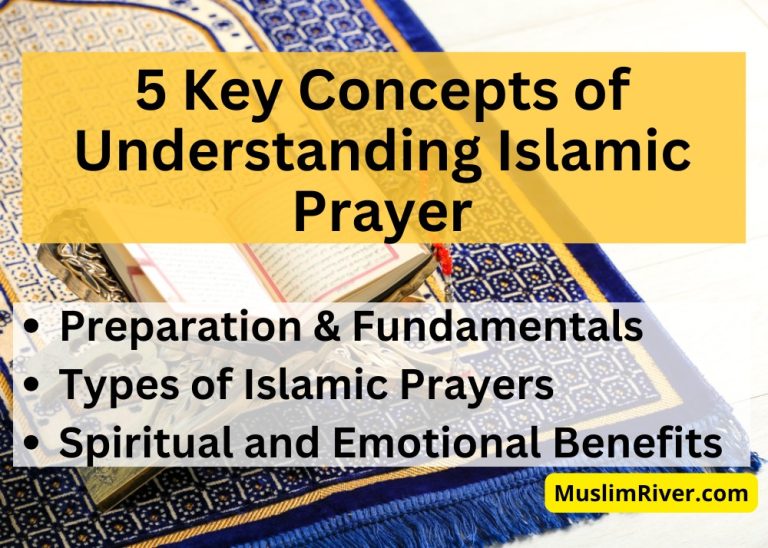Building Community Through Islamic Group Prayers
In our fast-paced lives, the quest for inner peace often feels daunting but uniting individuals in prayer helps them to address loneliness, stress, and the need for a nurturing community.
I dedicated countless hours to researching Islamic teachings and exploring the transformative power of communal worship.
Join me, in these practices through clear & accessible content.
You’ll discover how 4 group prayers, rules, timings & their benefits can profoundly impact your well-being.
My findings affirm that communal prayers not only enrich our spiritual journey but also foster a resilient, supportive community.
Stay with me as I will guide you in maximizing the power of group Namaz, ensuring your journey toward a more connected and fulfilling life.
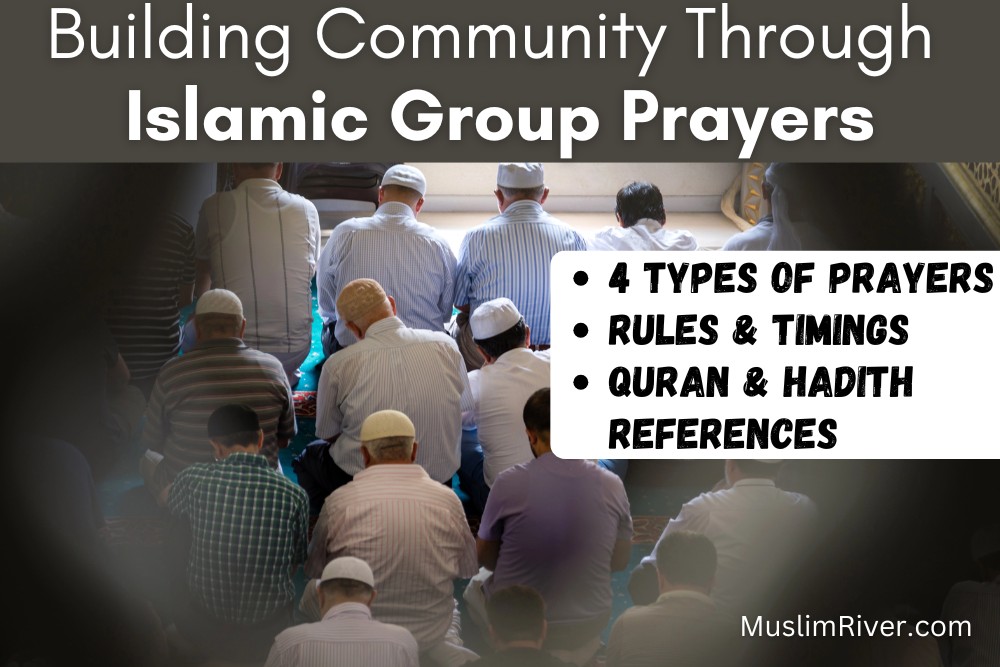
4 Types of Islamic Group Prayers & Their Benefits
Have you ever wondered how each group prayer uniquely enriches your spiritual and social life?
I’ll walk you through the 4 types of prayers Jummah Prayers, Tarawih and Ramadan Prayers, Eid Prayers (Eid-ul-Fitr & Eid-ul-Adha) & Funeral Prayer (Janaza).
Following these steps will help you achieve deeper spiritual connection, enhanced community bonding, and emotional well-being.
Let’s explore group prayers together and the transformative benefits these prayers offer.
a) Jummah Prayers
Jummah prayer, also known as Friday prayer, is a special congregational prayer that Muslims perform every Friday.
It is considered one of the most significant acts of worship in Islam and includes a sermon (Khutbah) followed by a short communal prayer (Salah).
Jummah prayer replaces the regular Dhuhr (noon) prayer on Fridays and holds great spiritual, social, and communal importance for Muslims.
💡 Tip: Arrive a few minutes early to connect with others and ease into the communal spirit.
Arabic: يَـٰٓأَيُّهَا ٱلَّذِينَ ءَامَنُوٓا۟ إِذَا نُودِىَ لِلصَّلَوٰةِ مِن يَوْمِ ٱلْجُمُعَةِ فَٱسْعَوْا۟ إِلَىٰ ذِكْرِ ٱللَّهِ وَذَرُوا۟ ٱلْبَيْعَ ۚ ذَٰلِكُمْ خَيْرٌۭ
لَّكُمْ إِن كُنتُمْ تَعْلَمُونَ ٩
Translation: O believers! When the call to prayer is made on Friday, then proceed ˹
diligently˺ to the remembrance of Allah and leave off ˹your˺ business. That is best for
you, if only you knew.
Source: Surah Al-Jumu’ah – 9 – Quran.com
b) Tarawih and Ramadan Prayers
Tarawih is a special nightly prayer performed by Muslims during the holy month of Ramadan.
It involves reciting extended portions of the Quran and is done immediately after the Isha (night) prayer.
Tarawih prayers are a cherished part of Ramadan, helping Muslims connect deeply with the Quran.
Here’s what you can expect:
- Promotes increased devotion
- Reinforces your faith
- Encourages warm social interactions
For example, during Ramadan nights, you might find that the shared reflections and discussions among congregants create a unique, uplifting experience.
Arabic: وعنه، رضي الله عنه قال: كان رسول الله صلى الله عليه وسلم، يرغب في قيام رمضان من غير أن يأمرهم
فيه بعزيمة، فيقول: “من قام رمضان إيمانًا واحتسابًا غفر له ما تقدم من ذنبه” . ((رواه مسلم)) .
Translation: Abu Hurairah (May Allah be pleased with him) reported: The Messenger of Allah (ﷺ) used to urge (the people) to perform (optional Tarawih) prayer at night during the month of Ramadan. He did not order them or make it obligatory on them. He (ﷺ) said, “Whosoever performs (optional Tarawih) prayers at night during the month of Ramadan, with Faith and in the hope of receiving Allah’s reward, will have his past sins forgiven.” [Muslim].
Source: Riyad as-Salihin 1188 – The Book of Virtues – كتاب الفضائل
c) Eid Prayers (Eid-ul-Fitr & Eid-ul-Adha)
Eid prayers are special congregational prayers that Muslims perform on the two major Islamic festivals:
- Eid-ul-Fitr (marking the end of Ramadan) &
- Eid-ul-Adha (the festival of sacrifice during Hajj season).
These prayers are a joyful expression of gratitude and community celebration, featuring a unique prayer format followed by a short sermon (Khutbah).
💡 Some Tips:
- Arrive early to secure a good spot
- Embrace the festive atmosphere
- Connect with community members
d) Funeral Prayer (Janaza)
Janaza prayer is the Islamic funeral prayer offered when a Muslim passes away.
Unlike other daily prayers, Janaza does not include bowing or prostration. Instead, people stand together and quietly pray, asking Allah to forgive, have mercy on, and grant peace to the deceased person.
It offers emotional comfort, reinforces community responsibility, and demonstrates spiritual unity.
Arabic: قَالُوٓا۟ إِنَّا لِلَّهِ وَإِنَّآ إِلَيْهِ رَٰجِعُونَ ١٥٦
Translation: Surely to Allah we belong and to Him we will ˹all˺ return
By understanding and engaging in Jummah, Tarawih, Eid, and Janaza prayers, you not only solve the challenges of isolation and stress but also build a resilient community.
Embrace these practices and experience the transformative power of communal worship—join a local congregation today!
Rules and Timings of Islamic Prayers
Curious how precise prayer timings and rules can be?
I’ll walk you through 2 key points that clarify prayer rules, help you adapt your practice, and strengthen community bonds.
Prayer timings and rules can enhance your spiritual routine and unite our community.
Let’s explore this together.
a) Every Friday after Zuhr, Jummah includes two sermons and two rakats, uniting diverse community members.
Where is it Performed?
Muslims perform Jummah prayer at mosques or community Islamic centers.
In Muslim-majority countries, every mosque hosts this prayer, while elsewhere, it typically takes place at Islamic centers, prayer rooms, or community halls.
Who Performs it?
Jummah prayer is obligatory (FARD) for adult Muslim males who are healthy, not traveling, and able to attend. Typically:
- IMAM: Leads the prayer and delivers the sermon. Even if an official imam isn’t present, a knowledgeable member can lead.
- MEN: Obligated to attend unless there’s a valid reason.
- WOMAN & CHILDREN: Encouraged but not obligated to attend.
Participating in Jummah fosters community bonding, spiritual growth, and social unity among Muslims.
💡 Tip: Arrive early to connect with others.
b) During Ramadan, Tarawih after Isha typically involves 8 or 20 rakats.
Where is it Performed?
Tarawih prayers are usually performed in mosques or Islamic community centers.
However, some Muslims also perform Tarawih prayers at home individually or with family, especially if they cannot attend communal gatherings.
Who Performs it?
Tarawih prayers are highly recommended (SUNNAH) for all Muslims—men, women, and children—though not mandatory.
Imams typically lead the congregation, reciting portions of the Quran aloud.
Adapt your practice by taking breaks or starting with fewer rakats as you build endurance.
c) Held after sunrise on Eid, these prayers (two rakats with extra Takbirs) celebrate communal gratitude.
Where is it Performed?
Eid prayers are typically held in large open spaces or mosques to accommodate the entire community.
Muslims gather in parks, sports grounds, community centers, or designated prayer halls, emphasizing unity and shared joy on these festive occasions.
Who Performs it?
Eid prayers are strongly recommended (highly emphasized Sunnah) for all Muslims—men, women, and children alike.
An Imam:
- Leads the prayer &
- Delivers a special sermon afterward
Entire families attend, wearing their best clothes and celebrating together, symbolizing unity, gratitude, and devotion within the Muslim community.
d) Janaza is a brief, solemn prayer for the deceased, reflecting collective compassion and support.
Where is it Performed?
Janaza prayers typically take place outdoors, in open grounds, or in designated areas of mosques or funeral homes. After the prayer, the body is taken to the cemetery for burial.
Who Performs it?
Janaza prayer is a collective responsibility (fard kifayah), meaning that while not every Muslim is obligated individually, the community as a whole must perform it.
It is usually led by an Imam or a knowledgeable community member.
Understanding these prayer timings and rules—from Jummah to Tarawih, Eid, and Janaza—helps you streamline your practice and deepen community ties.
Embrace these insights and strengthen your spiritual journey today!
Frequently Asked Questions
1. Is group prayer mandatory in Islam?
I believe group prayer is highly rewarding and recommended.
It strengthens our faith and fosters unity.
However, its obligation can vary depending on personal circumstances.
2. How do Muslims build their community?
Muslims build their community:
- Through regular gatherings for prayer and worship.
- By offering mutual support and engaging in community services.
3. Can non-Muslims observe or participate in Islamic group prayers?
Yes, non-Muslims are welcome to observe and sometimes participate.
It’s important to respect the etiquette: modest attire, quiet observation, and following the lead of the community.
I always encourage an open heart and respectful curiosity when learning about our traditions especially Islam.
4. How do I maintain consistency in group prayer attendance?
- Build a routine by scheduling your day around prayer times.
- Join community groups or buddy systems for mutual encouragement.
- Remind yourself regularly of the emotional and spiritual benefits that group prayer brings.
5. What should I do if I make a mistake in a group prayer?
Stay calm and continue with your prayer.
Remember that Allah is Most Merciful and understands our human imperfections.
View mistakes as part of the learning process and an opportunity to grow.
Conclusion
Reflecting on our journey through the different facets of Islamic group prayers.
I am inspired by the way each prayer—from Jummah and Tarawih to Eid and Janaza—offers us unique spiritual opportunities and practical guidance.
These prayers not only outline clear rules and timings but also serve as moments of profound connection, guiding us toward spiritual renewal, personal growth, and the rich tapestry of community life.
In my heart, group prayer is a source of emotional healing, gently reducing our daily stresses and reminding us that we are never alone in our struggles.
I invite you to embrace these moments of collective worship as a means to inspire and uplift your spirit.

